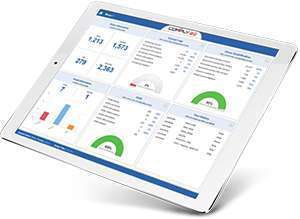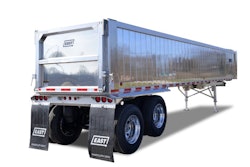 J.J. Keller’s Managed Services group offers reporting and consulting for fleet compliance.
J.J. Keller’s Managed Services group offers reporting and consulting for fleet compliance.Before the coronavirus pandemic hit in March, many commercial and private fleets had already outsourced their vehicle licensing, fuel taxes, driver qualification files, logbook auditing and other processes.
The demand for outsourcing grew last January when the U.S. Department of Transportation’s CDL Drug and Alcohol Clearinghouse added another step to fleets’ driver qualifications.
Fleetworthy Solutions had both current and new fleet customers asking for help with managing this additional task, said John Vosters, the company’s compliance strategy officer. Fleetworthy added this service to its menu of pre-employment checks that include Motor Vehicle Records (MVRs), Pre-Employment Screening Program (PSP) reports and criminal background checks, as well as verifying drivers’ work experience and safety performance.
COVID-19 also created more demand for compliance outsourcing as fleets thinned their offices and set up employees to work from home for health reasons. Having a remote workforce gave fleet managers a new perspective when considering which office functions to outsource.
Volatile market conditions since March also have caused fleets to furlough or lay off administrative staff, creating more need for outsourced compliance.
The total number of people employed in trucking fell by 1,200 in May, according to preliminary figures released the first week of June by the Department of Labor. Carrier employees laid off during the pandemic are starting to filter their way back into the workplace. Almost 45% of respondents said they had recalled non-driver staff and another 14% said they planned to do so by June 30.
The changing workforce
One of the first changes that Fleetworthy noticed when the pandemic hit in March was a drop-off in vehicle titling, registration and permits. Most fleets stopped purchasing new or used vehicles.
 Fleetworthy Solutions has a web portal its clients use to track their compliance.
Fleetworthy Solutions has a web portal its clients use to track their compliance.“We saw that come to a quick and abrupt change,” Vosters said.
The demand for pre-employment screening and management of driver qualification files also fell as fleets slowed their hiring, especially in the hardest-hit industry sectors such as oil and gas, he said.
While the demand declined for some managed services, it went up in other areas when fleets took steps to reduce overhead.
“We saw current clients, in many instances, looking for us to assist further,” Vosters said. Having employees work from home also prompted fleets to reassess their staffing needs, which also led to more outsourcing.
“They may have been a little overstaffed in some instances,” he said.
J.J. Keller & Associates last January experienced a significant increase in business from the clearinghouse, said Kari DuBois, the company’s senior director of Client Services. J.J. Keller also has seen demand for outsourcing grow from current clients who made staffing reductions and from companies that are consolidating their compliance vendors to gain efficiencies.
“With downsizing, [compliance] work still needs to get done,” DuBois said. Some of J.J. Keller’s largest clients are now seeking compliance services that they haven’t used previously in an ongoing effort to operate more efficiently by standardizing more processes and having its specialists support all the services.
“Because we have such a diverse landscape, we are able to pivot quite quickly,” she said.
The value proposition for outsourcing compliance and risk management centers on a provider’s technologies, expertise and time savings. Fleetworthy helps its clients realize a 25% to 30% cost reduction versus internal administration, Vosters said.
What-if analysis
After the electronic logging device mandate appeared in the rearview mirror, fleets no longer needed to outsource compliance for processing and auditing paper logbooks and timesheets. But as quickly as they replaced paperwork with data, fleets had as much, if not a greater, need to use managed services to audit their logbooks and timecards for hours of service compliance.
Fleets have come to rely on managed service providers to not only audit their compliance data but also analyze it. With changes coming to the HOS regulations this September, fleets are asking their providers to conduct “what-if” scenarios.
A short-haul fleet may want its service provider to analyze how it can squeeze out more productivity from drivers and assets by using the new short-haul exemption changes. Currently, fleets with vehicles that operate within a 100 air-mile radius of their home terminals do not have to keep a record-of-duty status. In September, that radius will extend to 150 air miles.
“The big opportunity is the insights that can be produced from the data,” DuBois said.











